📗 ‘So she was considering in her own mind (as well as she could, for the hot day made her feel very sleepy and stupid), whether the pleasure of making a daisy-chain would be worth the trouble of getting up and picking the daisies, when suddenly a White Rabbit with pink eyes ran close by her.’
– Lewis Carroll, Alice’s Adventures in Wonderland (emphases mine)

One of the things that language students worry the most about is learning vocabulary, since they tend to think of it as the greatest key to breaking through and becoming fluent in the language.
It can be hard to try to memorise lists and lists of vocabulary!
But don’t give up … 😊 One of the best ways to add to your store of new words is to make associations between pairs of words.
✏️ Our Lesson today is on antonyms and how they can help us enrich our vocabulary.
While most of the word pairs I have included here are words that you already know, you can always use the principle that is being applied in this Lesson to accumulate (gather) and memorise more words of your own choice.
✍️ Antonyms are words that are opposites. For example, the antonym of ‘happy’ is ‘sad’, while the antonym of ‘good’ is ‘bad’.
Just a few days ago (November 26th to be exact) many people around the world celebrated the 156th anniversary of the publication of Alice’s Adventures in Wonderland (1865) by Lewis Carroll.
📗 This is probably the most famous children’s classic in the English language, known all over the world!
👉 It also has lots of antonyms scattered throughout its pages, and our Lesson today will gather some of these antonym pairs together.
That way you can see which words you already know and be encouraged that at this season in your life – the end of 2021 – you can be proud of your progress so far, while still learning some tips to continue improving in the New Year!
In this Lesson we will:
- ✅ Review the main storyline in Alice’s Adventures in Wonderland
- ✅ (Re)discover 21 pairs of easy antonyms straight from the original book
- ✅ Test your knowledge with a short quiz at the end
If you have any question as you read through this that I haven’t answered for you here, please feel free to contact me through my query form.
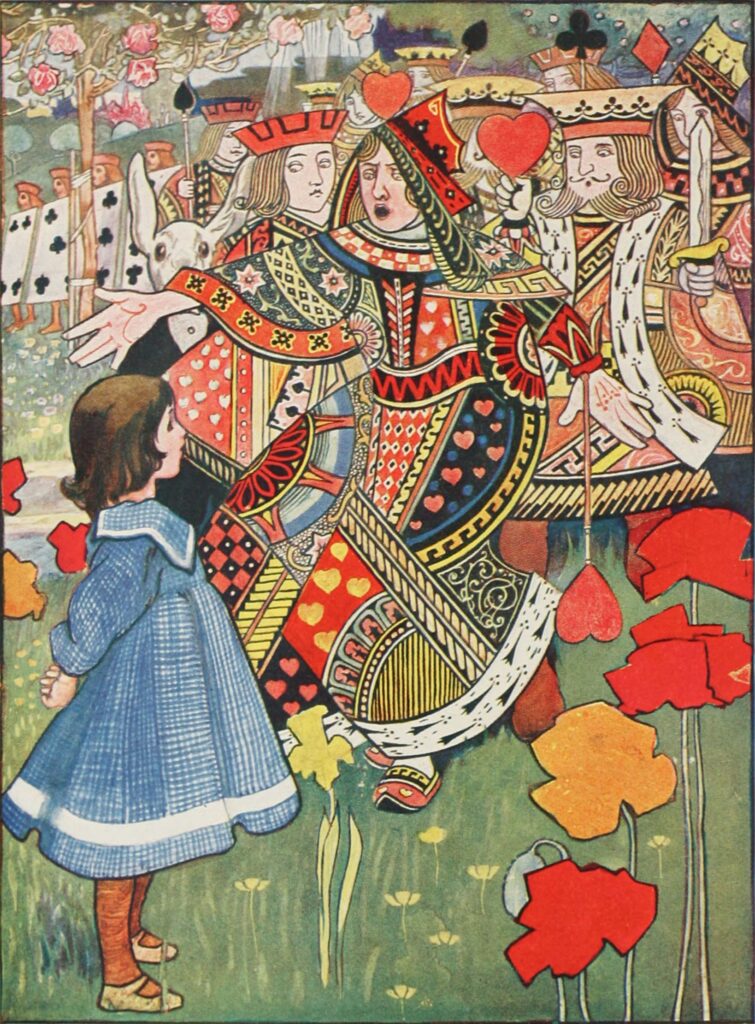
First of all, here is a short background description of Alice in Wonderland in my own words. I have selected and highlighted several antonym pairs throughout the text.
…
📝 ALICE’S ADVENTURES IN WONDERLAND (1865) BY LEWIS CARROLL
Alice is a sensible girl who ends up visiting a crazy world. Early in the story, she is sitting outside on the grass on a bright summer’s day, but when she sees a white rabbit run into a dark rabbit hole, she follows him inside. Among many different things there, she finds a bottle and a piece of cake: when she drinks one, it causes her to grow tall, when she eats the other, it causes her to grow small again.
Over the course of the story, Alice meets many interesting and unusual creatures and characters: a talking Mouse, a smiling Cheshire cat, a crazy March Hare and Mad Hatter drinking tea all day long, and a vicious Queen of Hearts who tries to behead everyone she dislikes. In this bizarre (very strange) world, Alice continues to speak with thoughtfulness and kindness to everyone she meets, especially anyone who is in a weak or vulnerable position (such as Queen’s gardeners). At the same time, she is also strong when faced with a sudden attack against her, only to discover in the same moment that she is sitting on a riverbank with her sister, who tells her it was all only a dream …
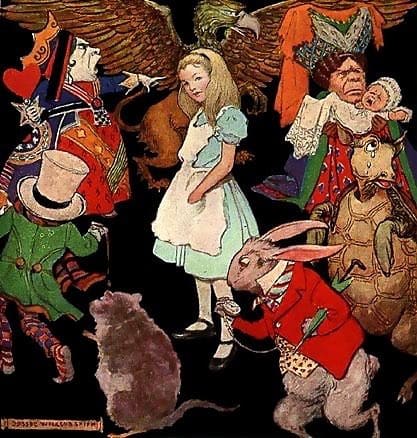
illustrated by Jessie Willcox Smith
(one of my favourite illustrators from that period).
Public Domain, via Wikimedia Commons
…
📝 21 ANTONYM WORD PAIRS FOUND IN ALICE’S ADVENTURES IN WONDERLAND
Here are some passages from the book. Read them through without worrying about the meaning of every word. I have provided definitions of some valuable words below, but I would like you to focus above all on grasping the general idea they describe.
How many of these antonym pairs do you know?
#1 PLEASURE – TROUBLE
📗 ‘So she was considering in her own mind (as well as she could, for the hot day made her feel very sleepy and stupid), whether the pleasure of making a daisy-chain would be worth the trouble of getting up and picking the daisies, when suddenly a White Rabbit with pink eyes ran close by her.’
– Lewis Carroll, Alice’s Adventures in Wonderland (emphases mine)

Image Credit: Pixabay
#2 NIGHT – MORNING … DIFFERENT – SAME
📗 ‘“Dear, dear! How queer everything is to-day! And yesterday things went on just as usual. I wonder if I’ve been changed in the night? Let me think: was I the same when I got up this morning? I almost think I can remember feeling a little different. But if I’m not the same, the next question is, Who in the world am I? Ah, that’s the great puzzle!”’
– Lewis Carroll, Alice’s Adventures in Wonderland (emphases mine)
…
#3 WET – DRY
📗 ‘They were indeed a queer-looking party that assembled on the bank— the birds with draggled feathers, the animals with their fur clinging close to them, and all dripping wet, cross, and uncomfortable. The first question of course was, how to get dry again …’
– Lewis Carroll, Alice’s Adventures in Wonderland (emphases mine)
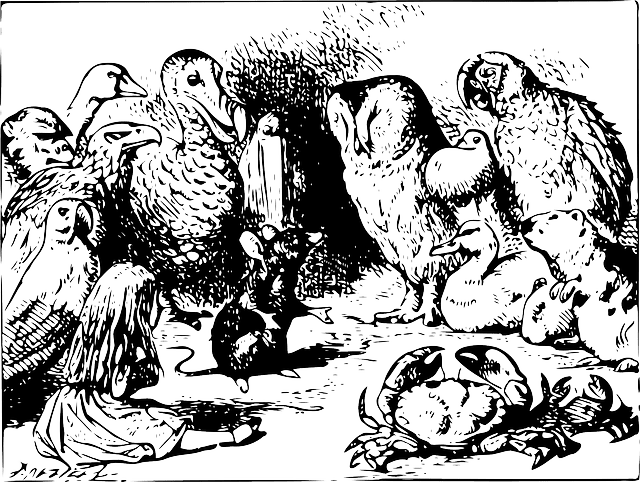
Illustration most likely by John Tenniel (1865). Image Credit: Pixabay
#4 WHISPER – SHRIEK
📗 ‘There was a long silence after this, and Alice could only hear whispers now and then; such as, “Sure, I don’t like it, yer honour, at all, at all!” “Do as I tell you, you coward!” and at last she spread out her hand again, and made another snatch in the air. This time there were two little shrieks, and more sounds of broken glass.’
– Lewis Carroll, Alice’s Adventures in Wonderland (emphases mine)
✏️ Note: A ‘whisper’ is something that is spoken very low and might have a soft murmuring, soothing, or annoying sound for listeners. On the other hand, a ‘shriek’ is a loud, sharp, piercing scream – the complete opposite of a whisper.

Illustration by John Tenniel (1865)
Image Credit Pixabay
#5 LARGER – SMALLER
📗 ‘Alice noticed with some surprise that the pebbles were all turning into little cakes as they lay on the floor, and a bright idea came into her head.
“If I eat one of these cakes,” she thought, “it’s sure to make some change in my size; and as it can’t possibly make me larger, it must make me smaller, I suppose.”’
– Lewis Carroll, Alice’s Adventures in Wonderland (emphases mine)

Image Credit: Pixabay
#6 BEGINNING – END
📗 ‘“That is not said right,” said the Caterpillar.
“Not quite right, I’m afraid,” said Alice, timidly; “some of the words have got altered.”
“It is wrong from beginning to end,” said the Caterpillar decidedly, and there was silence for some minutes.’
– Lewis Carroll, Alice’s Adventures in Wonderland (emphases mine)
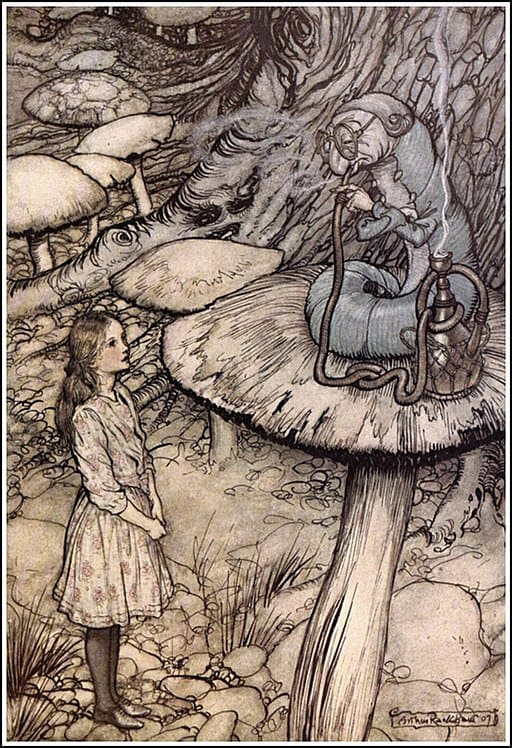
Image Credit: Public Domain, via Wikimedia Commons
#7 TALLER – SHORTER
📗 ‘This time Alice waited patiently until it chose to speak again. In a minute or two the Caterpillar took the hookah out of its mouth and yawned once or twice, and shook itself. Then it got down off the mushroom, and crawled away in the grass, merely remarking as it went,
“One side will make you grow taller, and the other side will make you grow shorter.”’
– Lewis Carroll, Alice’s Adventures in Wonderland (emphases mine)
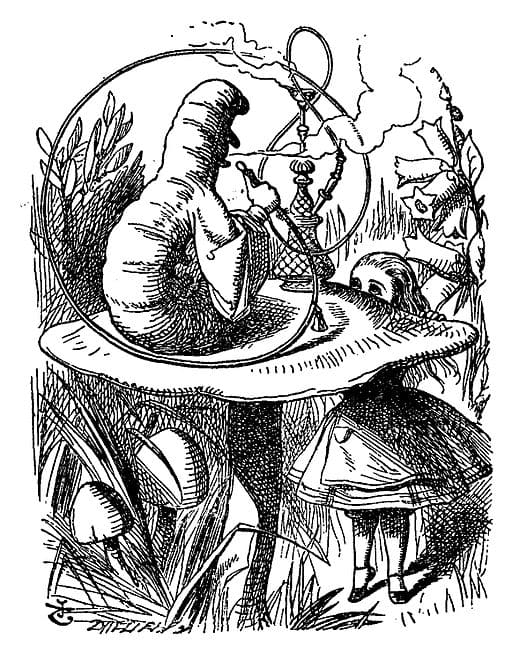
Public Domain, via Wikimedia Commons
#8 STRANGE – USUAL
📗 ‘It was so long since she had been anything near the right size, that it felt quite strange at first; but she got used to it in a few minutes, and began talking to herself, as usual.’
– Lewis Carroll, Alice’s Adventures in Wonderland (emphases mine)
✏️ Note: Some synonyms (words that are similar to another) of ‘usual’ could be ‘normal’, ‘ordinary’, ‘common’. When we say that someone did something ‘as usual’, it means that they were in the habit of doing that particular thing, it was a normal or common activity for them.
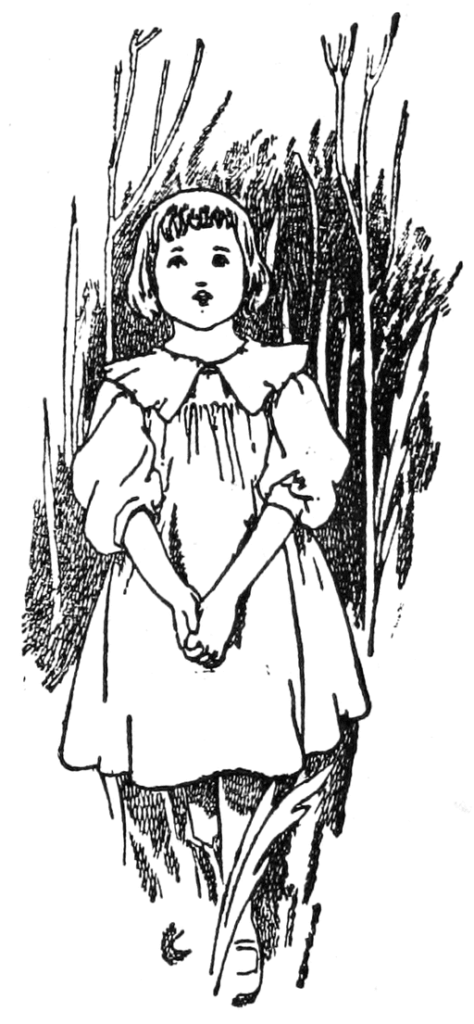
Image Credit: Public Domain, via Wikimedia Commons
#9 ‘IN A LOUDER TONE’ vs ‘MUTTERED’
📗 ‘“How am I to get in?” asked Alice again, in a louder tone.
“Are you to get in at all?” said the Footman. “That’s the first question, you know.”
It was, no doubt: only Alice did not like to be told so. “It’s really dreadful,” she muttered to herself, “the way all the creatures argue. It’s enough to drive one crazy!”’
– Lewis Carroll, Alice’s Adventures in Wonderland (emphases mine)
✏️ Note: I took a liberty here as strictly speaking ‘in a louder tone’ is not an antonym of ‘muttered’, but they do describe activities that are the complete opposite of one another. To ‘mutter’ is to say something under your breath, as if talking quietly to yourself (this is different from a ‘whisper’ which is spoken quietly to someone else). On the other hand, to ‘ask … in a louder tone’ describes what is the very opposite of ‘muttering’: Alice wants the Footman to hear her question clearly!
…
#10 APPEARING – VANISHING
📗 “Did you say pig, or fig?” said the Cat.
“I said pig,” replied Alice; “and I wish you wouldn’t keep appearing and vanishing so suddenly: you make one quite giddy.”
“All right,” said the Cat; and this time it vanished quite slowly, beginning with the end of the tail, and ending with the grin, which remained some time after the rest of it had gone.
“Well! I’ve often seen a cat without a grin,” thought Alice; “but a grin without a cat! It’s the most curious thing I ever saw in my life!”
– Lewis Carroll, Alice’s Adventures in Wonderland (emphases mine)
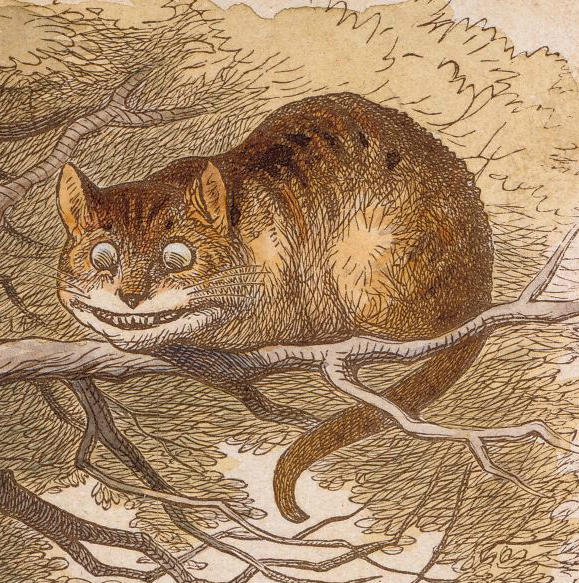
Image Credit: Public Domain, via Wikimedia Commons
#11 ENCOURAGING – RUDE
📗 “Have some wine,” the March Hare said in an encouraging tone. …
… “Your hair wants cutting,” said the Hatter. He had been looking at Alice for some time with great curiosity, and this was his first speech.
“You should learn not to make personal remarks,” Alice said with some severity; “it’s very rude.”
– Lewis Carroll, Alice’s Adventures in Wonderland (emphases mine)
✏️ Note: The word ‘encouraging’ is usually used to describe something that encourages or inspires someone. Usually, we would say that its antonym would be the word ‘discouraging’.
However, in the context used above, the March Hare is simply encouraging Alice by his gentle tone to have some wine. ‘Encouraging’ simply refers to his tone as polite, refined, and gentle – this is the word’s particular meaning in this sentence. As such, it is the antonym of ‘rude’.
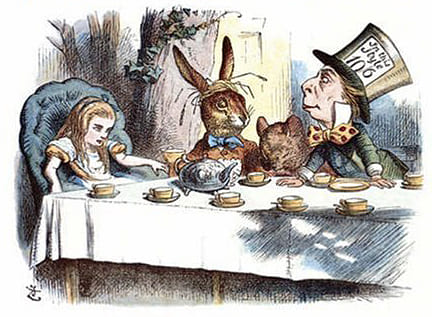
Image Credit: Public Domain, via Wikimedia Commons
#12 LESS – MORE
📗 “Take some more tea,” the March Hare said to Alice, very earnestly.
“I’ve had nothing yet,” Alice replied in an offended tone, “so I can’t take more.”
“You mean you can’t take less,” said the Hatter: “it’s very easy to take more than nothing.”
– Lewis Carroll, Alice’s Adventures in Wonderland (emphases mine)
…
#13 RUNNING / TUMBLING – SETTLED DOWN
📗 ‘“Get to your places!” shouted the Queen in a voice of thunder, and people began running about in all directions, tumbling up against each other; however, they got settled down in a minute or two, and the game began.’
– Lewis Carroll, Alice’s Adventures in Wonderland (emphases mine)
You will notice how I have highlighted three words in this quotation above!
✏️ I did so because even though ‘running’ and ‘tumbling’ have some distinguishing differences, they both capture an idea of chaos and messy action which is the opposite of someone who has ‘settled down’, that is, someone who is quietly and calmly situated.
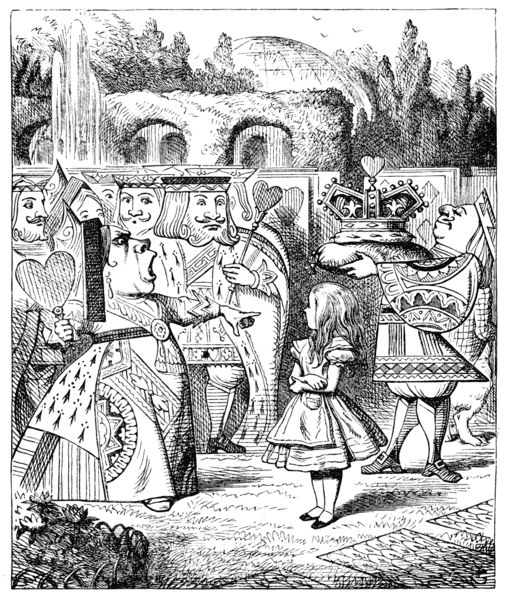
Image Credit: Public Domain, via Wikimedia Commons
#14 TALKING – [BEING] SILENT
📗 ‘When she got back to the Cheshire Cat, she was surprised to find quite a large crowd collected round it: there was a dispute going on between the executioner, the King, and the Queen, who were all talking at once, while all the rest were quite silent, and looked very uncomfortable.’
– Lewis Carroll, Alice’s Adventures in Wonderland (emphases mine)
…
#15 PLEASANT – SAVAGE
📗 ‘Alice was very glad to find her in such a pleasant temper, and thought to herself that perhaps it was only the pepper that had made her so savage when they met in the kitchen.’
– Lewis Carroll, Alice’s Adventures in Wonderland (emphases mine)
✍️ Let’s take a moment to consider some synonyms of ‘pleasant’: ‘peaceful’, ‘tame’, ‘calm’, ‘civilised’, ‘cultured’, ‘gentle’, ‘polished’, ‘polite’, ‘refined’, and ‘sophisticated’.
These words help to show how ‘savage’ is one possible antonym of ‘pleasant’. Some other antonyms of ‘pleasant’ could be ‘unpleasant’, ‘disagreeable’, ‘harsh’, ‘rude’, ‘nasty’, ‘repulsive’, ‘cruel’ and ‘mean’.
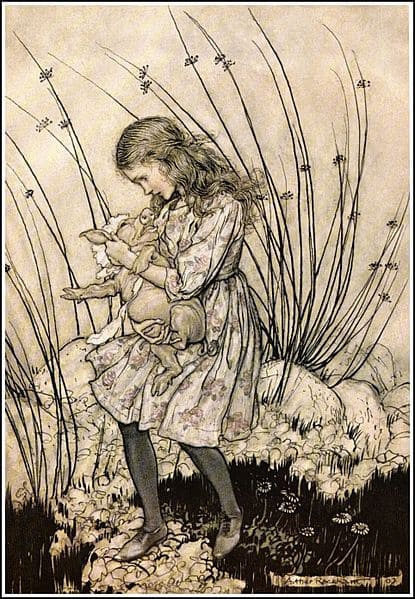
Image Credit: Public Domain, via Wikimedia Commons.
#16 FINISH – BEGIN
📗 ‘So they sat down, and nobody spoke for some minutes. Alice thought to herself, “I don’t see how he can ever finish, if he doesn’t begin.” But she waited patiently.’
– Lewis Carroll, Alice’s Adventures in Wonderland (emphases mine)
…
#17 LAUGHING – GRIEF
📗 ‘“I went to the Classics master, though. He was an old crab, he was.”
“I never went to him,” the Mock Turtle said with a sigh: “he taught Laughing and Grief, they used to say.”’
– Lewis Carroll, Alice’s Adventures in Wonderland (emphases mine)
✏️ Remember: ‘Grief’ means a heartfelt sadness that is expressed in one way or another. ‘Laughing’ refers to happiness or pleasure that is also expressed outwardly. In this way, these words function as antonyms of one another.
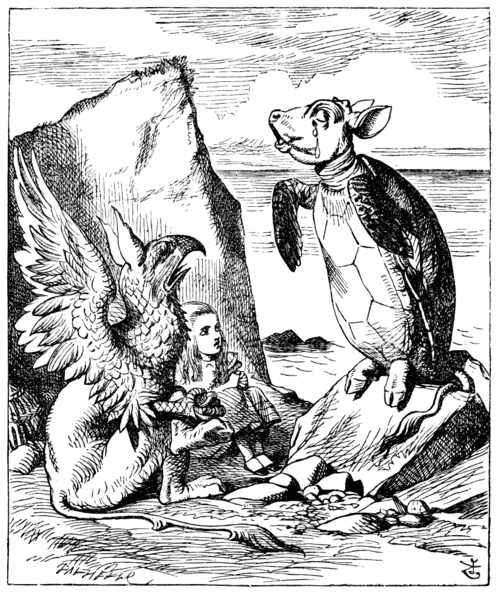
Image Credit: Public Domain, via Wikimedia Commons.
#18 UNCOMMON – NATURAL
📗 ‘“Well, I never heard it before,” said the Mock Turtle; “but it sounds uncommon nonsense.”
Alice said nothing; she had sat down with her face in her hands, wondering if anything would ever happen in a natural way again.’
– Lewis Carroll, Alice’s Adventures in Wonderland (emphases mine)
…
#19 IMPORTANT – UNIMPORTANT
📗 “What do you know about this business?” the King said to Alice.
“Nothing,” said Alice.
“Nothing whatever?” persisted the King.
“Nothing whatever,” said Alice.
“That’s very important,” the King said, turning to the jury. They were just beginning to write this down on their slates, when the White Rabbit interrupted: “Unimportant, your Majesty means, of course,” he said in a very respectful tone, but frowning and making faces at him as he spoke.
“Unimportant, of course, I meant,” the King hastily said, and went on to himself in an undertone,
“important— unimportant— unimportant— important—” as if he were trying which word sounded best.
Some of the jury wrote it down “important,” and some “unimportant.” Alice could see this, as she was near enough to look over their slates; “but it doesn’t matter a bit,” she thought to herself.
– Lewis Carroll, Alice’s Adventures in Wonderland (emphases mine)

Image Credit: Pixabay.
#20 SOMEBODY – NOBODY
📗 ‘“I haven’t opened it yet,” said the White Rabbit, “but it seems to be a letter, written by the prisoner to— to somebody.”
“It must have been that,” said the King, “unless it was written to nobody, which isn’t usual, you know.”’
– Lewis Carroll, Alice’s Adventures in Wonderland (emphases mine)
…
#21 UP – DOWN
📗 ‘At this the whole pack rose up into the air, and came flying down upon her: she gave a little scream, half of fright and half of anger, and tried to beat them off, and found herself lying on the bank, with her head in the lap of her sister, who was gently brushing away some dead leaves that had fluttered down from the trees upon her face.’
– Lewis Carroll, Alice’s Adventures in Wonderland (emphases mine)
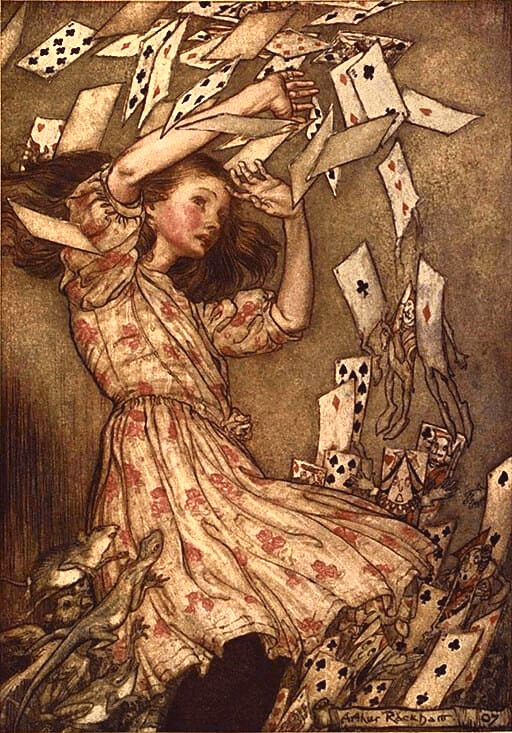
Illustration by Arthur Rackham (1907).
Image Credit: Public Domain, via Wikimedia Commons.
✏️ Note: We can use the verb ‘to rise’ to describe an upward action even if we don’t use the preposition ‘up’ afterwards. For example: ‘The audience rose in their seats to applaud (congratulate with clapping) the orchestra’.
However, in some situations, especially ones describing an energetic action, we use ‘to rise’ with ‘up’. Consider these sentences:
- ✒️ The fans rose up in their seats to cheer the football team.
- ✒️ The leader called on the people to rise up and defend their country.
- ✒️ I like it when I rise up in the morning and the sun is already shining brightly.
- ✒️ The children wanted to go surfing but the waves were rising up too high for them to do it safely.
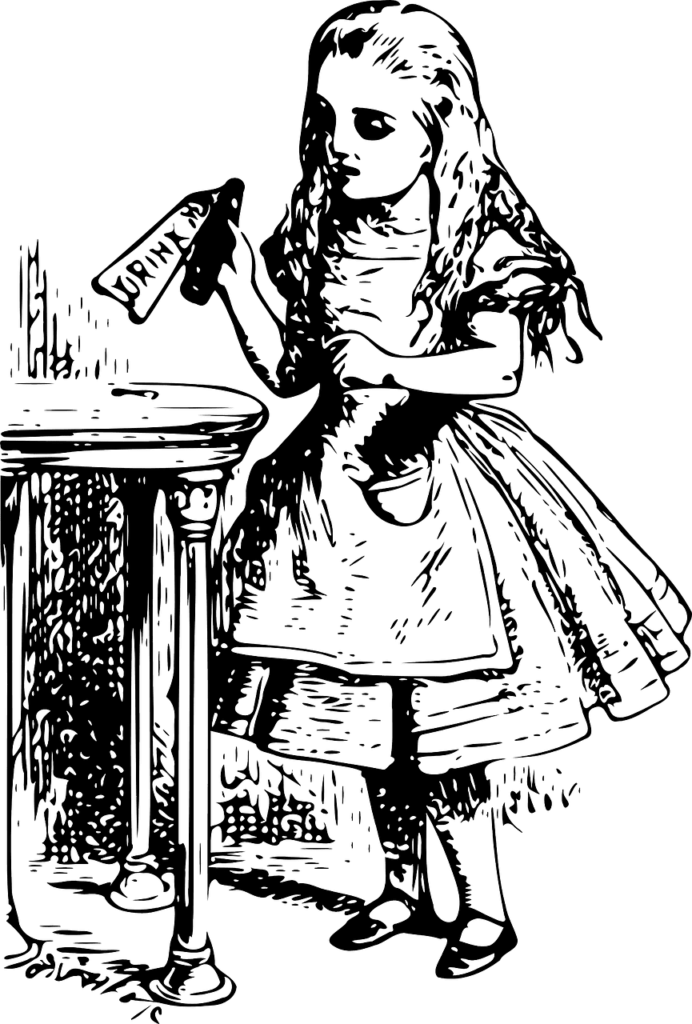
Illustration by John Tenniel (1865).
Image Credit: Pixabay
👉 As promised, here is a chance to test your understanding of what antonyms are. Use it as the first opportunity of many to discover more antonyms and learn them off by heart!
(You will find the answers below if you need them).
…
📝 QUICK QUIZ: Guess the antonyms of the following highlighted adjectives
📗 ‘Alice did not much like keeping so close to her: first, because the Duchess was very ugly; and secondly, because she was exactly the right height to rest her chin upon Alice’s shoulder, and it was an uncomfortably sharp chin. However, she did not like to be rude, so she bore it as well as she could.’
– Lewis Carroll, Alice’s Adventures in Wonderland (emphases mine)

‘She came upon a low curtain she had not noticed before, and behind it was a little door about fifteen inches high: she tried the little golden key in the lock, and to her great delight it fitted!’
(Illustration probably by John Tenniel, 1865).
Image Credit: Pixabay
💡 Answers:
- close – near
- ugly – beautiful
- sharp – soft
- rude – polite



